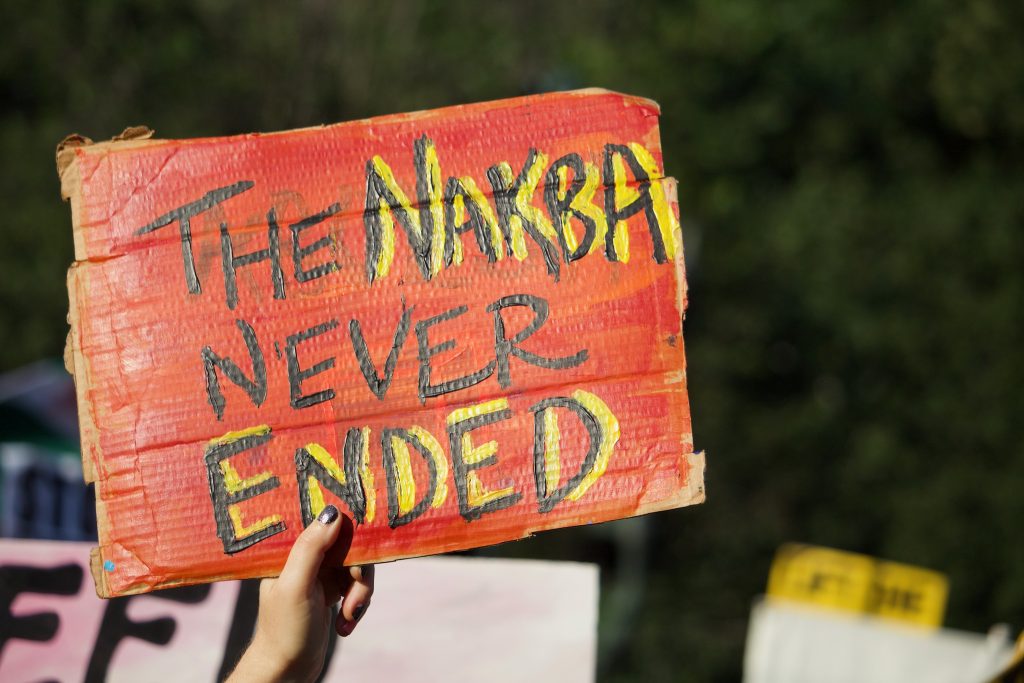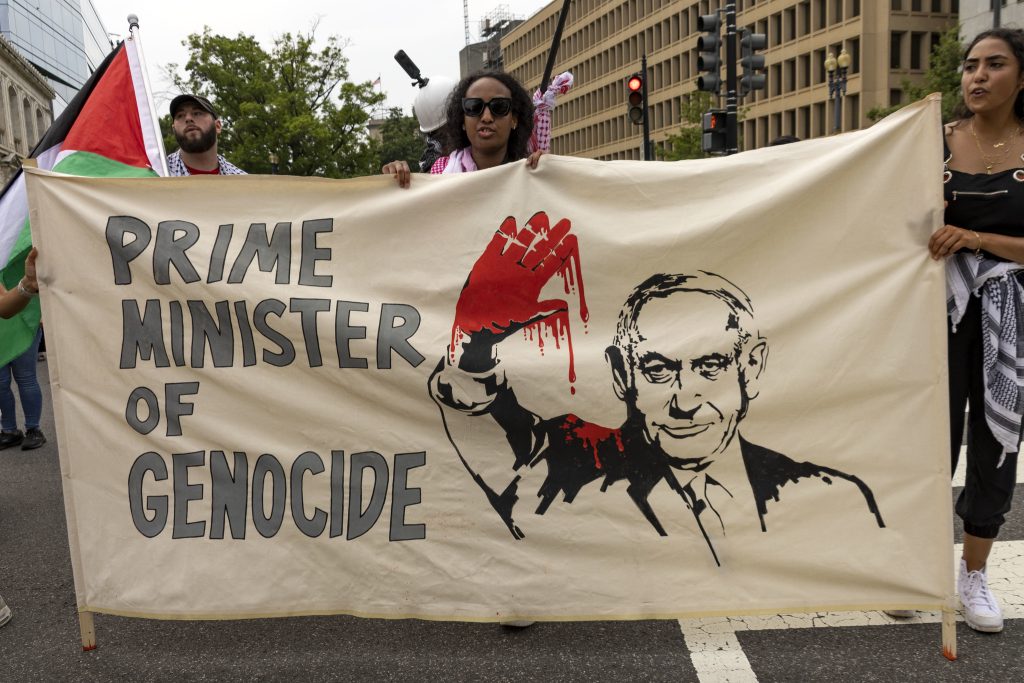The UK’s ‘recognition’ of a Palestinian state is worse than worthless
by Sean Bell
“The State of Palestine is the state of Palestinians wherever they may be. The state is for them to enjoy in it their collective national and cultural identity, theirs to pursue in it a complete equality of rights.”
As such documents go, the Palestinian Declaration of Independence does not suffer from ambiguity. Written by the poet Mahmoud Darwish – who brought to the text the kind of lambent clarity only a poet is capable of – and proclaimed, despite the best efforts of Israel, in Algiers on November 15, 1988, the declaration now reads as not just the confirmation of a state already embodied by its people, but as a telling counterpoint to those who, speaking today of a Palestinian state in potentia, would presume to attach conditions to its legitimacy.
The State of Palestine, the declaration affirms, will safeguard the political and religious convictions of the Palestinian people by means of a parliamentary democratic system of governance, based on “principles of social justice, equality and nondiscrimination… under the aegis of a constitution which ensures the rule of law and an independent judiciary”. The state commits to the principles of the United Nations, the Universal Declaration of Human Rights, and to working with all states and peoples to “assure a permanent peace based upon justice”.
Not only did the declaration outline a Palestinian state suspiciously similar to the only kind its would-be international guarantors now claim would be acceptable (though not entirely – as ever, the notion that Palestine might have a “natural right to defend its territorial integrity and independence” was too much for some to swallow), but the proclamation’s aftermath did much to cement the vaunted ‘two-state solution’ which still holds a death-grip upon the most moribund of Western political imaginations.
Within a month, 75 nations had recognised Palestine, rising to 93 by February 1989. Predictably, the United States was not among them, and where the US went, its client-states reliably followed. Ironically, had those countries joined with the majority of the world, they might be considerably closer to seeing the sort of Palestinian state so many of them purport to desire. Unfortunately, none of us – the Palestinian people least of all – have time for alternative history.
France, Canada, Australia and Britain once refused to countenance a Palestinian state – now, they appear either ready to do so, or at least dangle the possibility. ‘Better late than never’ is not an axiom that can be applied in an ongoing genocide. In an age of corpses, what is such recognition actually worth?
***

Begin with the only context that should matter. On 10 August, Gaza’s Ministry of Health reported that at least five more Palestinians had starved to death over the preceding 24 hours. This brings the toll of those who have died from malnutrition since the beginning of the war to 227, including over 100 children, who join almost the almost 62,000 Gazans slaughtered by Israel.
These facts and figures, along with the unrelenting tide of images that speak to their undeniable reality, come to us primarily through the media, and Israel knows it. That is why an Israeli drone strike obliterated the tent of five Al Jazeera journalists on 10 August, an act of targeted assassination tragically unremarkable in a conflict that has produced the highest number of deaths in the profession since the Committee to Protect Journalists first began gathering such data in 1992.
It is against this backdrop that many of those used to setting the tone began, with mounting unease, to comprehend that their usual positions may no longer be tenable.
Published only months before the attacks of October 7, Ghada Karmi’s One State: The Only Democratic Future for Palestine-Israel offered prescience that with hindsight is almost unnerving in its accuracy. Looking to the future, Karmi wrote:
“On past performance, we can anticipate a knee-jerk response to defend Zionism and safeguard the state with overwhelming force. Israel would intensify its anti-Palestinian repression, accelerate its colonisation programme, go on building the wall, and try to expel or starve out the Palestinians to thin their numbers. At the same time, the worldwide army of Israel’s supporters would be mobilised to stifle the faintest anti-Israel criticism, and silence Palestinian voices everywhere it mattered. Antisemitism allegations would feature largely in this campaign, and attempts at influencing government legislation in Western states to outlaw criticism of Israel and Zionism would be intensified.”
Over the past 22 months, Karmi’s predictions have been borne out almost everywhere you care to look, from the UK Government’s proscription of Palestine Action and the mass-arrests of over 500 of its sympathisers earlier this month, to the multi-pronged authoritarianism unleashed upon pro-Palestinian campus encampments by the Trump administration – an administration which might not have come to power, were it not for the US Democrats’ abject cowardice in the face of Gaza’s nightmare.
And yet, Karmi concludes, “as a result of these attacks, Palestinians would feel they had no choice but to continue resisting by every means, and this time, they might carry world public opinion with them”. Once again, Karmi has been proven correct. Now that public opinion does appear to be moving against those who, for the better part of two years, circled every argument back to Israel’s “right to defend itself” against hospitals, schools, children and people being able to eat, a discernible shift has taken place.
In New York, the city’s political and financial elites are still trying to wrap their heads around the fact that a Muslim democratic socialist is not just likely to be their next mayor, but that his unapologetic anti-Zionism may have played a considerable role in his success; meanwhile, a posse of former Obama staffers-turned-podcasters broke the habit of a lifetime and cautiously allowed that perhaps eternal, no-strings-attached military aid to Israel may not be entirely salutary; and in Scotland, in between cheating at golf, President Trump admitted that “based on television… those kids look very hungry”.
Following Trump’s Caledonian excursion, First Minister John Swinney – who, alongside Prime Minister Keir Starmer, dutifully made the trip to Turnberry to kiss the ring – seemed to sense the prevailing mood as well, soon thereafter describing for the first time Israel’s war on Gaza as a “genocide”. This is, to be clear, the lowest possible bar of honesty with regards to Gaza – but still one which appears insurmountable to Starmer.
Instead, Starmer laid down the gauntlet: unless “substantive steps” were taken by the Israeli government to end humanitarian suffering in Gaza, agree to a ceasefire and “commit to a long-term, sustainable peace”, the UK would recognise a Palestinian state.
What a simple idea. One wonders why he never tried it before.
***

For anyone who might mistake this for political courage, bear in mind this is Keir Starmer we’re talking about.
Starmer’s ultimatum came not only in the aftermath of Emmanuel Macron’s confirmation that France would become the first G7 nation to recognise Palestine, but was reportedly emboldened by the calculation that his announcement would inspire little more than indifference from the White House.
Conveniently, this shift in UK policy also draws attention away from the 645 RAF reconnaissance flights flown over Gaza in the first phase of the war – roughly twice as many as were flown by the Israelis or the Americans – and the question of exactly what the data gathered has been used for, as well as the 350 British government-sanctioned arms export licenses with Israel (heroically whittled down by David Lammy to a mere 330).
Speaking to Jacobin recently, the journalist James Robins, author of the recent Blowing Up Everything is Beautiful: Israel’s Extermination of Gaza, noted: “At every stage, the British government has done the barest minimum possible to look like they object to the annihilation of Gaza, but in reality, they are just as complicit as the Germans or, indeed, the United States.” Starmer’s bold new plan is the latest manifestation of this charade.
And of course, the prize of UK recognition will only be delivered in September, despite the fact that time – like food, medicine, or any form of support from Western governments that might halt or meaningfully lessen their suffering – is something the people of Gaza do not have.
Following Starmer’s announcement, a statement from the prime minister’s office went into greater, if more risible detail: “We have long been committed to recognising a state of Palestine” may fit some definition of the truth, in the same way I have long been committed to paying off my student loans. The statement went on to say that, while statehood is “the inalienable right of the Palestinian people”, it is “not in the gift of any neighbour”.
“The prize of UK recognition will only be delivered in September, despite the fact that time – like food, medicine, or any form of support from Western governments that might halt or meaningfully lessen their suffering – is something the people of Gaza do not have.”
Despite this, Starmer had no qualms about specifying precisely what this state should look like. Is this a game anyone can play? I have some modest and sensible thoughts on how the United States might be rearranged (good news, Mexico – you’re getting California back), but inexplicably, I still await a phone-call from the Powers That Be.
Along with France, Canada and Australia, the UK Government is unequivocal that Hamas can play no role in a future Palestinian state, because nothing signals respect for an inalienable right to self-determination like foreign nations deciding who can and cannot make up your government. Additionally, Canadian Prime Minister Mark Carney’s announcement that Canada will also recognise a Palestinian state at the United Nations in September came with the caveat that this would only take place if Palestinians committed to “demilitarisation”. The right to self-defence, it seems, is not universal. Israel’s defence – and Palestinian suffering – remains fuelled by a steady flow of French-made military components, even while Macron talks of lending Palestinian statehood his questionable imprimatur.
Founded in the aftermath of the Holocaust, Israel immediately set about making itself into a state whose military superiority would be at once unquestionable and regularly demonstrated. Meanwhile, should they emerge from their own attempted eradication, Palestinians are expected to be satisfied with a glorified municipality about as empowered as Scottish Borders Council.
As Ahmad Ibsais wrote in The Nation earlier this month, these nations “offer Palestinians the same poisoned chalice they have offered for decades: recognition without sovereignty, statehood without power, liberation without freedom. They offer us their idea of liberation while making sure we are never really free, because a free Palestinian, in their mind, is a dangerous one.”
One manner of nation-state is not just as good as any another; the nature of its independence will either reflect or limit the liberation it represents. Scotland has no excuse not to understand this.
The Palestinian Declaration of Independence came with the knowledge amongst those who proclaimed it that their state would still need to be fought for: “We pledge that our struggle shall be continued until the occupation ends, and the foundation of our sovereignty and independence shall be fortified accordingly.”
Now, those who pretend their rhetorical generosity can achieve what the Palestinian people so far have not instead demand that, in order to be worthy of their recognition, a Palestinian state must be defended by no one – least of all the Palestinians themselves.
***

And so, we find ourselves at a strange impasse where numerous Western governments are willing to grapple with the idea of a Palestinian state – albeit with conditions that the average pyramid scheme would consider tacky – because the alternative is facing the reality of the Israeli state and the ideology of Zionism which underpins it.
“Whatever the reasons,” observed the journalist Adam Johnson earlier this month, “whatever the colonial indoctrination, whatever the internal propaganda, whatever the racism at work, Israeli society, especially its body politic, remains in a genocidal fervour almost two years on, and overt support for starvation, ethnic cleansing and mass killing remains the majority position among Israelis.”
Genocide is not an unhappy accident; it is the policy of Israel, and Starmer’s weak-sauce threat to arrive at a party 37 years too late will not dissuade Netanyahu nor the Israeli far-right upon which his government depends – nothing will, so long as the United States remains Israel’s steadfast benefactor.
Starmer almost certainly knows this, which is why recognising a Palestinian state in the wake of the Israeli parliament’s vote to annex the West Bank and Netanyahu’s push to militarily occupy the entirety of Gaza – a plan one Israeli official has referred to as “full conquest” – is, in terms of bleak absurdity, only a few degrees shy of Spain recognising a Catalan republic on the dark side of the moon. It is roughly equivalent to offering those dying daily from a manufactured famine a photograph of thin gruel.
Statehood is no defence against genocide; my curious paucity of Armenian relatives stands in testament to that. Yet statehood is not without meaning, the self-evidence of which should require little explanation, especially to Scottish readers. States have rights – rarely iron-clad, but better to have than not – which stateless peoples lack, to their recurring cost.
For Starmer and other alleged statesmen, the most non-negotiable precondition of Palestinian statehood is that it emerge as part of a ‘two-state solution’, that article of faith which we are told, in lieu of all evidence, is the only reliable path to peace. For decades, lip-service has been paid to this idea, whilst its advocates either sorrowfully bemoan or flat-out ignore the fact this plan offers no ‘solution’ worth the name to the right of return, the division of territory, or the apartheid system at the heart of the Israeli state. And so, the dance continues – Israel’s right to exist shall never be questioned, while the Palestinians shall have the right to a state, even if it never comes to exist.
The state that will never be recognised by the West is also the only one that offers a real and just solution. In Ghada Karmi’s words:
“In a single state, no Jewish settler would have to move and no Palestinian would be under occupation. The country’s scarce resources could be shared without Israel stealing Palestinian land and water, or Palestinians left starving and thirsty. Jerusalem would be a city for both peoples, not the preserve of Israel to the anger of Arabs, Muslims and Christians, and the detriment of international law. Palestinian refugees would be allowed to return to their original homeland, if not to their actual homes. Their long exile and blighted existence would end… The long-running sore of dispossession that had embittered generations of Palestinians and perpetuated their resistance could heal at last.”
It is the global pro-Palestinian movement which has consistently understood this; it is why ‘from the river to the sea’ is far more than a catchy slogan or a fashionably maximalist demand. Rather, it is the only way forward, the only option left that is both credible and not one more stain upon the conscience of the world. The countless activists who have at every turn been dismissed, slandered, silenced, suppressed, arrested, beaten or deported not only hold the moral high ground over any Western government, but possess an analysis and a solution more realistic than any alternative they have to offer.
If our leaders wish to recognise something, they should recognise that.
Main photo credit: Alisdare Hickson / Flickr, Creative Commons BY-NC-SA 2.0
Contributor
Sean Bell is a writer and journalist based in Edinburgh. His work has appeared in The National, The Herald, Source and Jacobin.